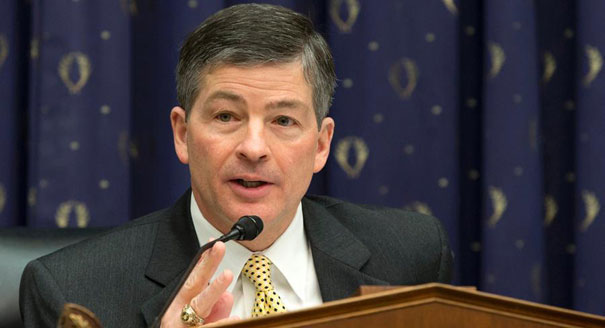Consumer beware: Regulators ‘on steroids’

RIPPING REGULATORS: Jeb Hensarling, chairman of the House Financial Services Committee, says Dodd-Frank and its regulators are the problem, not the solution.
By Kenric Ward | Watchdog.org
WASHINGTON, D.C. — Financial regulations imposed after the 2008 Wall Street crash are backfiring on consumers and pose a “compliance nightmare” for lenders.
“What we have are policymakers on steroids,” U.S. Rep. Scott Garrett charged Tuesday.
“They have contempt for the public,” said the New Jersey Republican, who complained that the Federal Reserve Board has yet to provide an unredacted report of events leading up to the financial meltdown six years ago.
Lawyers from four federal agencies defended their actions, asserting that banks have bounced back under their watch and Dodd-Frank financial reforms.
“Dodd-Frank is designed to strengthen the mortgage market. We’re acting to reduce regulatory burdens,” said Meredith Fuchs, general counsel for the 3-year-old Consumer Financial Protection Bureau.
U.S. Rep. Jeb Hensarling, chairman of the House Committee on Financial Services, countered that just the opposite is happening.
“There’s a ‘gotcha attitude,’” the Texas Republican said. “It’s led to a downsizing of consumer lending programs.”
Liberal Democratic Rep. Keith Ellison agreed.
“The regulatory regime has swung too far. It’s closing off good people trying to do legitimate transactions,” the Minnesotan said.
The Federal Deposit Insurance Corp. reported that since Dodd-Frank was enacted, fewer U.S. banks offer free checking accounts, while customer fees rise. Credit card companies, meanwhile, are shutting down more accounts and lowering credit lines.
Yet Republican efforts to require the Congressional Budget Office to conduct cost-benefit analyses of new federal regulations were mocked by Rep. Maxine Waters.
“Excessive borrowing and risky investments were the problem (in 2008) — not federal regulators,” said the California Democrat.
Hensarling accused federal agencies under Dodd-Frank of “engaging in de facto rulemaking without a rulemaking process.”
He charged CFPB with “abusive practices,” citing alleged targeting of third-party (payday) lenders, as well as discrimination complaints by some of its own employees.
“You’re imposing a standard for others that you are incapable of living under yourself,” he told Fuchs.
Barred from a CFPB meeting this year, Rep. Sean Duffy, R-Wis., called the agency “as secret as the CIA.”
“These meetings should be open and transparent,” he said.
Paul Gallagher, on the economic staff of Executive Intelligence Review, told Watchdog.org that Dodd-Frank is “riddled with loopholes” that pose a grave, but little-known, threat to U.S. consumers.
“Banks are disappearing. They are being obstructed. Regulators have nothing to claim credit for,” he said.
Gallagher points to Section II of Dodd-Frank, which he says authorizes the confiscation of bonds of unsecured creditors and the seizure of uninsured deposits — as has occurred in Cyprus and Spain.
“This ‘bail-in’ will make the (2008) bailouts look orderly by comparison,” he warned.
Disputing the regulators’ claim of a rejuvenated banking system, Gallagher reported, “The rate at which U.S. banks are disappearing is high and accelerating” through acquisitions.
“We’ve seen the number of banks decline from 8,200 to 6,900” in less than a decade, as larger financial institutions get even bigger.
FREE MARKETEER: Former BB&T chairman John Allison says Dodd-Frank regulations increase financial risk.
John Allison, former chairman and CEO of BB&T Bank, says neither Dodd-Frank nor heavy-handed regulators have altered the “too big to fail” philosophy that triggered multibillion-dollar taxpayer bailouts by the Bush and Obama administrations.
“The most significant damage is the belief that additional regulations are necessary,” Allison wrote in his 2013 book, “The Financial Crisis and the Free Market Cure.”
Calling the U.S. banking industry “grossly misregulated,” the president and CEO of the libertarian Cato Institute said bureaucrats’ incentives “are political, not economic.”
“If fully implemented, (Dodd-Frank) will make U.S. financial firms less competitive and drive resources out of the United States,” Allison predicted.
“Ironically, it will also increase risk, as unregulated firms headquartered in foreign locations will have a larger market share.”
Kenric Ward is a national reporter for Watchdog.org and chief of the Virginia Bureau. Contact him at kenric@watchdogvirginia.org or at (571) 319-9824. @Kenricward







